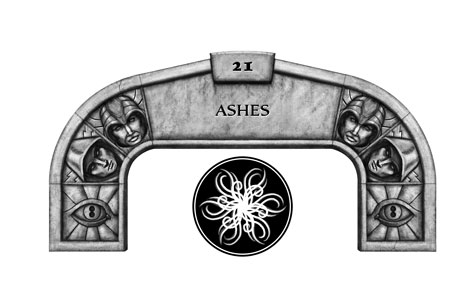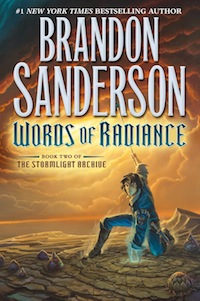Welcome back to the Words of Radiance Reread on Tor.com! Last week, Carl explored the relationship of “friends” old and new and the unexpected appearance of mink on Roshar. This week, we examine the aftermath of the conflux of caravans, converts and crooks.
This reread will contain spoilers for The Way of Kings, Words of Radiance, and any other Cosmere book that becomes relevant to the discussion. The index for this reread can be found here, and more Stormlight Archive goodies are indexed here. Click on through to join the discussion.

Chapter 21: Ashes
Point of View: Shallan
Setting: The Frostlands
Symbology: Pattern, Talenel, Nalan
IN WHICH Bluth is mourned; bandits are executed; a significant picture is retrieved; Shallan strikes a bargain with the caravan owner, and the caravans are conjoined under her authority; Vathah is trouble; Pattern is resourceful; Tvlakv is skeptical, suspicious, bitter, and resigned; Tvlakv’s slaves are appropriated by Shallan; a prayer of thanks is offered and burned; and former deserters stand the taller for it.
Quote of the Week:
The former deserters gathered in front of the flames and looked at the prayer. Then they turned and looked outward, seeing—as if for the first time—the two dozen people standing there and watching. Silent in the night. Some had tears on their cheeks; some held the hands of children….
…The deserters didn’t seem to know how to react, surrounded by that constellation of thankful eyes and tearful appreciation. Finally, they burned the prayer. Shallan bowed her head as they did, as did most of those watching.
She left them standing taller, watching the ashes of that prayer rise toward the Almighty.
After all the discussion in last week’s comments about the possible transformative powers of Lightweaving, I have to say that the transformation, whatever it was, is only now complete. (Or as complete as it can be without new habits and attitudes being established, anyway.) Even after these men made a choice to be better than they were, it’s not until they see the difference reflected in the eyes of others that they truly see themselves as being better.
Commentary: “Ashes.” It’s a fitting title. This chapter is full of death, burning, and bitter confrontation.
As Vathah goes around grimly executing the remaining bandits, Shallan closes Bluth’s eyes, not looking at the carnage of his body. In his pocket she finds the answer to the question left hanging last week: who had removed a page from her sketchbook? Bluth had taken “her picture of him. The one that depicted him not as he was, but as she imagined he might once have been. A soldier in an army, in a crisp uniform. Eyes forward, rather than looking down all the time. A hero.” She seems grieved for and proud of him, but there’s no real indication that she feels in any way responsible for the change in him; I’m not sure if that’s good or bad. Still:
“I was wrong,” she whispered. “You were a fine way to restart my collection, Bluth. Fight well for the Almighty in your sleep, bold one.”
Even now, this brings tears to my eyes. And even now, I’m amazed that an author could write a character who is moderately despicable and essentially unlikeable—someone to whom my most positive emotional response had been on the underside of indifference—and then make me cry when he dies.
Shallan moves on to find the caravan owner, while around her the survivors pull corpses to the fires for burning—more ashes—and sort through the contents of overturned wagons. In spite of being tired, sore, disheveled, grungy, and totally lacking in Illusion, she manages to project enough confidence that she convinces Macob and Tyn that she is, and should be, in charge of the whole shebang, that her need of them is only for the comforts they can provide on the journey. Inwardly, she acknowledges the fact that she needs their presence to keep her new “soldiers” mindful of civilization and heroism.
Vathah’s behavior certainly bears out that necessity as he walks with her past the burning dead: he’s disillusioned (heh) with what he sees of her now; he doesn’t believe there’s any fundamental change in himself or his men; he certainly doesn’t believe she can keep her promise to have them all pardoned and their debts forgiven. Fortunately, he’s also a bit wigged out by disembodied voices (nice one, Pattern!), but he’s clearly going to be trouble.
(Jumping forward to what we know by the end of the book… I spent the entire book, from this point forward, just waiting for him to really be trouble, but it never happened. Now I’m trying to figure out whether it just hasn’t happened yet, or whether he’s truly changed his mind and is loyal to Shallan. What’s your guess?)
The next confrontation is with Tvlakv, who has concocted this marvy conspiracy theory in which Bluth and Shallan were in cahoots with the deserters, but it has a rather sieve-like quality which even he sees when he tries to accuse Shallan of it. While he’s still trying to figure out whether it really leaks as bad as all that, she moves on to commandeer his slaves. Whether it would have worked had he not been already off balance is unknown; as it is, she totally steamrolls him. First she tells him he’d better hope the Almighty is a farce, because otherwise he’s got a special place in Damnation waiting for him. Then she claims the slaves, and over his first word of objection,
“I saved your life, you oily little man,” Shallan said. “You will give me these slaves in payment. Dues in recompense for my soldiers protecting you and your worthless life.”
He claims it’s robbery; she tells him it’s justice. If you don’t like it, go cry to the king about it. Hey, that should work. Then she proceeds to tell these five men, these slaves, that if they want to run they won’t be pursued—but if they stay, they can serve her and work toward their freedom. The deal is that they get six firemarks a week if they agree to put five of them toward their slave debt; one, if not. So the slaves go from being treated like animals to serving a light-eyed lady; no worries about getting caught for a runaway; good pay for a job that is far from onerous; and the probability of paying off their slave debt and becoming free men again. Shallan gets servants who are completely loyal, and who have a vested interest in keeping her happy. Works out pretty well for everyone, except maybe Tvlakv—but I no longer have much sympathy for him. (It’s odd. At the end of TWoK, even though he treated Kaladin badly, I had this sort of sneaking soft spot for him, but it’s all, all gone now. Not sure quite how that happened—it’s just the opposite of what happened with Bluth. Maybe because Bluth died trying to be better, while Tvlakv did everything greasy thing he could to avoid being involved in any way. Maybe because of the contrast.)
Anyway, after surprising Tvlakv by actually paying him for a wagon, she walks away… right past the fire where the last body is being thrown into the flames. Then comes the scene from the QOTW: the caravan folk hold out a sheet of paper to a former deserter (who just happens to be Gaz). It is a prayer—not of mourning for their losses, but of thanks for the “soldiers” who came to their rescue. Finally, finally, finally. They’d wanted a second chance, but in the battle and the aftermath they were too busy to think about it much. Now they look around to find men, women, children—families who are alive because a bunch of deserters dared to be better than they thought they were, and it has a profound impact. Whether the initial impetus was a matter of charisma or Lightweaving, this has nothing to do with either magic or impulsive decisions to acquit themselves like men. This is a matter of seeing gratitude right up close and personal, face to face with people who see them as heroes. This, I believe, is the point where permanent change takes root; by burning the prayer to the Almighty, they accept that these people are thankful both to and for them, and it can’t help but reshape their view of themselves. They stand taller, as they watch the ashes of the prayer rise to the Almighty.
But I still wonder about Vathah.
Heraldic Symbolism: For once, the Heralds seem fairly obvious. Talenel is the Herald of soldiers, the one whose ideological role is Soldier. His Heraldic attributes are dependable/resourceful. Essentially, he’s the Herald associated with everything Shallan induced these former deserters to become. Nalan is, of course, the Judge, the Herald of justice, which may be reflective of Shallan’s claim of “justice” when she appropriates Tvlakv’s slaves. However, the Soulcasting property associated with his corresponding gemstone is… wait for it… smoke. Ashes, again.
(At least no one said, “Blood and bloody ashes!” did they? That would have been singularly apt, and very, very wrong. Heh.)
Well, that’s all for now, folks. Next week, Carl will take us back to the warcamps on this self-same night, as Kaladin stands guard duty during the up-coming highstorm. After that, we’ll be taking a holiday break so as to not be attempting to post rereads on Christmas and New Year’s Day, and I’ll return with a new chapter on January 8. Given that Firefight comes out on January 6, we may be borrowing the Chapter 22 thread to collect questions to ask Brandon on his tour, so keep that in mind as well. We can hash out wording and priority when the tour gets announced, right?
Merry Christmas, everyone! Stay safe in all your holiday celebrations, and give someone an extra hug just because you’re both alive.
Alice Arneson is a long-time Tor.com commenter and Sanderson beta-reader. She has been a fantasy lover since the age of eight, when her third-grade teacher loaned her his copy of The Hobbit. (Thanks, Mr. Hamilton!) She’s also a full-time wife & mom with degrees in engineering, literature, and chemistry. Nice combination, eh?










